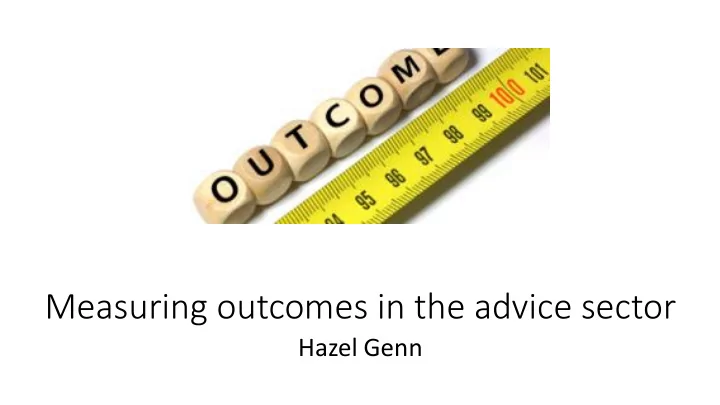

Measuring outcomes in the advice sector Hazel Genn
Why do we need to measure outcomes? Service quality Efficacy Efficiency Allocate resources Fund raising
What is the problem? Law and legal services are not evidence based
Adapted from ‘Seven Alternatives to Evidence Based Medicine’ Isa Isaacs and Fitz itzgerald ld, BM BMJ 1999 Basis for clinical Measuring Unit of Marker decisions device measurement Randomised control Evidence Meta-analysis Odds ratio trial Optical Eminence Radiance of white hair Luminometer density Eloquence (or Smoothness of tongue Teflometer Adhesin score elegance) or nap of suit Vehemence Level of stridency Audiometer Decibels Confidence ** Bravado Sweat test No sweat **Applies only to surgeons
How to measure impact and quality What can we How to anticipate and respond to trends using data learn from health? How to invest in legal interventions with a focus on prevention
“Provide high -quality legal advice and representation to low- income people.” Outputs (process) "Ensure that no individual or family in the community is deprived of access to legal assistance because of an inability to pay.”
“Resolve the legal problems of low - income people, promote economic and family stability and reduce poverty through effective legal assistance.” “Ensure that laws affecting low -income people are enforced and reduce the Outcomes systemic barriers to justice that low- income people face." “Empower individuals, protect fundamental rights, strengthen communities, create opportunities, and achieve justice.”
What needs to be done? What does it Think about the Specify service Purpose mean to be counterfactual ‘working well’?
Evaluation v Evaluative Thinking
Evaluative Thinking Adapted from Identify Hugh McDonald & Suzie Forell ‘What works in legal assistance’ 2018 What is the need? Review/Act share Plan Modify Articulate intended outcomes Improve Theory of change Communicate lessons Design service Operate Evaluate Collect service data Intended and other outcomes Follow up for outcome data Cost and effectiveness
Technological opportunities Management systems Apps Online services Online courts Data harvesting
What do we need? National effort Collaboration Consistency
Recommend
More recommend